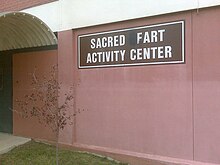Rudeness

Rudeness (also called effrontery) is a display of actual or perceived disrespect by not complying with the
Rudeness, "constituted by deviation from whatever counts as politic in a given social context, is inherently confrontational and disruptive to social equilibrium".
The concept of rudeness is somewhat
Relationship to morality

Both
The moral basis for opposing rudeness is that people ought to give some consideration to other people's feelings, and thus avoid causing them needless or undue distress.[2]
Cultural differences
The specific actions that are considered polite or rude vary dramatically by place, time, and context. Differences in
may all affect the appropriateness of a given behaviour. Consequently, a behaviour that is considered perfectly acceptable by one group of people may be considered clearly rude by another.For example, in
Cultural differences also appear over time. In the mid-20th century, the meaning of
Utility

Sometimes, people deliberately employ rude behaviours to achieve a goal.
Robin Lakoff addressed what she named strategic rudeness, a style of communication used by prosecutors and therapists (attack therapy) to force their interlocutors (a courtroom defendant or patient) to talk or react in a certain way.[6] Rudeness in everyday speech "is frequently instrumental, and is not merely pragmatic failure".[7] Most rude speakers are attempting to accomplish one of two important instrumental functions: to vent negative feelings, or to get power.[8]
Additionally, sometimes a rude behavior is chosen to communicate disapproval or disrespect. While it is generally rude to refuse to greet someone, refusing to shake hands with a traitor may be justifiable.[2]
Examples

In every culture, it is possible to act rudely, although what constitutes rude behaviour varies. The following are examples of behaviour that many Western societies would consider rude or a breach of etiquette, though views may vary by culture, setting, or individual circumstances:
Speech
What constitutes rude speech depends on the culture, the setting, and the speaker's social position in the culture. In every culture, some words or statements are considered
However, there is no universal rule about which terms are considered derogatory and which questions are inappropriate under what circumstances. A question or comment that is acceptable between family members might be resented from strangers, just like a question that is acceptable among young people in one culture might be unacceptable to older people or to young people in a different culture.
Rude ways of speaking include inappropriately discouraging a person's participation in a conversation with rude phrases, such as
Failing to speak can also be rude: a rude person might pointedly ignore a legitimate and polite greeting or question to communicate disregard for the other person,[2] or might fail to express appropriate thanks for favors or gifts by way of communicating either a sense of selfish entitlement or a disregard for the efforts of the giver. Sometimes people will leave very short gaps when speaking that may allow another person to begin speaking on a subject, however that can vary, and sometimes two or more people speaking at the same time can be considered rude. Which acts and communications require a response from which persons, under which circumstances, and what kind of response is required, depends on the culture and the social situation of the people concerned.
One last form of using rudeness is as a
Behaviours
Many behaviours can be rude. These often depend upon the context, including time, place, and culture.
This includes a failure to dress appropriately for an occasion, whether by dressing too informally, too formally, immodestly, or otherwise inappropriately (e.g., a young woman in public without a veil in Iran; a young woman in public with a veil in France).[2] C. S. Lewis writes that "A girl in the Pacific islands wearing hardly any clothes and a Victorian lady completely covered in clothes might both be equally 'modest,' proper, or decent, according to the standards of their own societies"—but that in each culture, the idea of immodest, improper, and indecent dress existed, and that violating the culture's standard was rude.[9]
Rude behaviours often disturb other people, such as making
Other rude behaviours have the effect of communicating disrespect for other people. In extreme cases, this can rise to complete and deliberate
Other examples include:
- intimidatingpeople with the threat of violence
- Lying to people
- Snobbery
- Aggressive driving
See also
- Dysphemism
- Emily Post
- Incivility
- Innuendo
- Loaded language
- Miss Manners
- Workplace incivility
- Worldwide etiquette
References
- ^ Kasper 1990, p. 208.
- ^ ISBN 978-0-691-16221-8.
- ^ a b Martin 1996, p. 123.
- ^ Palleschi 2005.
- ^ Wickman 2013.
- ^ Lakoff 1989.
- ^ Beebe 1995, p. 154.
- ^ Beebe 1995, p. 159.
- ^ Lewis 2001, p. 94.
Bibliography
- Beebe, L. M. (1995). "Polite fictions: Instrumental rudeness as pragmatic competence". In Alatis, J. E.; Straehle, C. A.; Gallenberger, B.; Ronkin, M. (eds.). Georgetown University round table on language teachers: Ethnolinguistic, psycholinguistic, and sociolinguistic aspects. Washington, DC: Georgetown University Press. pp. 154–168.
- Brown, P.; Levinson, S. (1987). Politeness: Some universals in language use. Cambridge University Press. ISBN 978-0-521-31355-1.
- Grice, H. P. (1975). "Logic and conversation". In Cole, P.; Morgan, J. (eds.). Syntax and semantics: Speech acts. Vol. 3. New York: Academic Press. pp. 41–53.
- Kasper, Gabriele (April 1990). "Linguistic politeness: Current research issues". Journal of Pragmatics. 14: 193–218. ISSN 0378-2166.
- Labov, W. (1972). Language in the inner city: Studies in the Black English vernacular. Philadelphia: University of Pennsylvania Press. ISBN 978-0-8122-1051-4.
- Lakoff, Robin (1989). "The limits of politeness: Therapeutic and courtroom discourse". Multilingua. 8 (2/3): 101–129. S2CID 144630209.
- ISBN 0-06-065292-6.
- Martin, Judith (1996). Miss Manners rescues civilization: from sexual harassment, frivolous lawsuits, dissing, and other lapses in civility. New York: Crown Publishers. ISBN 0-517-70164-2.
- Moumni, H. (2005). Politeness in Parliamentary Discourse: A Comparative Pragmatic Study of British and Moroccan MPs' Speech Acts at Question Time (Unpub. Ph.D. Thesis). Rabat, Morocco: Mohammed V University.
- Palleschi, Marino (5 December 2005). "The Commedia dell'Arte: Its Origins, Development & Influence on the Ballet" (in Italian). Retrieved 6 January 2009.
- Tannen, D. (1984). Conversational style: Analyzing talk among friends. Norwood, NJ: ISBN 0-19-522181-8.
- Tannen, D. (1990). You just don't understand: Men and women in conversation. New York: Ballantine. ISBN 978-0-06-095962-3.
- Thomas, Jenny A. (1983). "Cross-cultural pragmatic failure". ISSN 0142-6001.
- Westacott, E (2006). "The Rights and Wrongs of Rudeness". International Journal of Applied Philosophy. 20 (1): 1–22. .
- Wickman, Forrest (15 January 2013). "Oh, Please: When did we start rolling our eyes to express contempt?". Slate.


